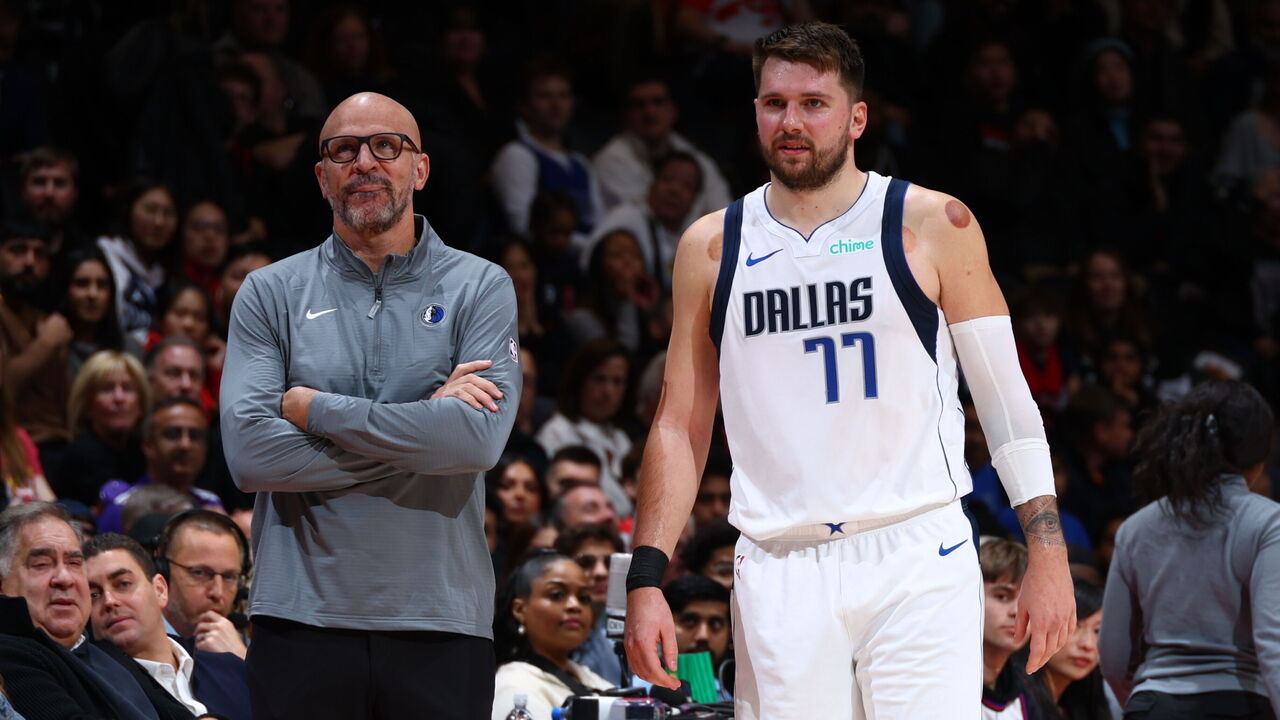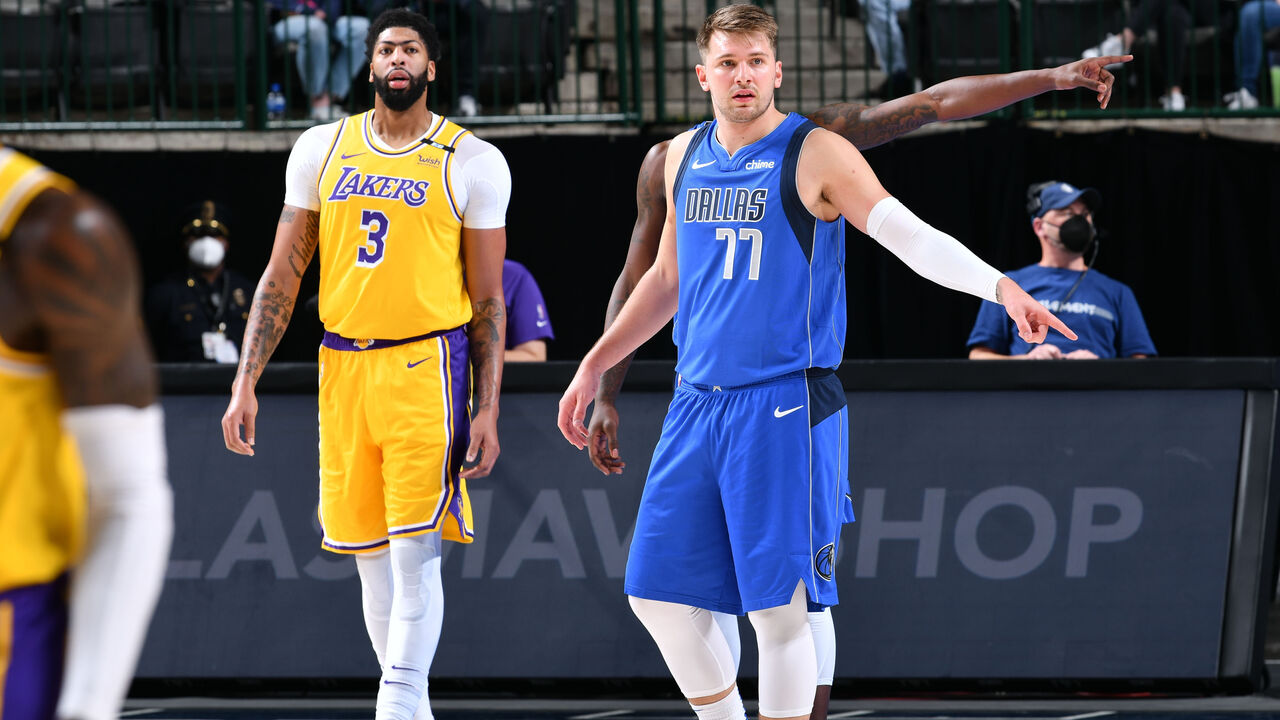Mavs trading Doncic is a move of historically baffling proportions
Even seasoned reporters had good reason to believe ESPN news-breaker Shams Charania might've been hacked when he tweeted that Luka Doncic had been traded for Anthony Davis in a three-team deal that also sent Max Christie and a 2029 first-rounder to the Mavericks. It was too shocking and unfathomable.
The NBA has always been prone to bigger and more frequent blockbusters, but a trade of this magnitude has almost no precedent across the sports world. Perhaps the closest comparison was trading Wayne Gretzky from Edmonton to Los Angeles in the summer of 1988. That's the transaction pantheon this deal will live in, with the unique distinction of having been completed midseason (while the Lakers and Mavericks occupy postseason spots).
On the rare occasions when superstars of Doncic's caliber are traded, the decision to move on is often player-driven. Charles Barkley was famously traded from Philadelphia to Phoenix in a lopsided deal, only to win MVP and lead the Suns to the 1993 NBA Finals, but Sir Charles wanted out of Philly and was 29 years old at the time.
Doncic is a 25-year-old perennial MVP candidate who trails only Michael Jordan and Wilt Chamberlain in per-game scoring, trails only Jordan in playoff scoring, and ranks fourth among active players in assists per game. He already has as many All-NBA first-team selections (five) as Hall of Famers such as Barkley, Jason Kidd, and Julius Erving, among others. He's eight months removed from his first Finals appearance and has at least a year and a half of team control left. And his team decided to move on from him.
It was mind-bending enough for us to consider whether some sort of Doncic-related scandal was waiting to be exposed. How else could Dallas' thinking possibly be rationalized? Surely not in basketball terms, though general manager Nico Harrison tried his best.
"I believe that defense wins championships," Harrison told ESPN's Tim MacMahon. "I believe that getting an All-Defensive center and an All-NBA player with a defensive mindset gives us a better chance. We're built to win now and in the future."

Concerns about Doncic's defense, conditioning, and endless whining to officials are all valid, especially when he was due for a $345-million extension this summer (which he's no longer eligible for). But few stars are perfect, and those are concerns you simply learn to live with as a trade-off for employing one of the greatest offensive talents of our time. In digging into the ramifications of the new CBA, I wondered how the more punitive tax penalties and apron restrictions might impact second-tier stars in their quest for full max contracts. I never considered that a team would be discouraged from paying up for a top-five level alpha.
A Doncic-level star - who might not have even peaked yet - gives a team a tremendous head start in building a sustainable contender. Players such as Doncic are the great equalizers in a sport and league uniquely positioned to be star-driven and dominated. And the Mavericks gave him away for pennies on the dollar.
That's no knock on Davis, a future Hall of Famer in his own right. But the only active players worth trading Doncic for at this stage of their respective careers are Victor Wembanyama, Shai Gilgeous-Alexander, and Nikola Jokic. Even if Doncic wanted out of Dallas and suppressed his trade market by telegraphing a preferred destination ahead of his potential 2026 free agency, the Mavericks still could've commanded much more in return than they ultimately received from the Lakers.
Deciding to trade Doncic is unconscionable enough. That Dallas then negotiated with only one team - and not a team with stockpiles of draft capital or young talent - was malpractice of epic proportions.
Nico just said Luka gave no indication he wanted out or wouldn't sign an extension moving forward. He also said the Lakers were they only team he talked to.
— Jason Gallagher (@jga41agher) February 2, 2025
He's saying this directly into a microphone.
It's also rather rich that Doncic's conditioning was reportedly a trigger for a trade that netted the Mavs an injury-prone big man who is six years older and, like Doncic, is currently on the shelf. Not to mention, this is the same franchise that took a massive risk in acquiring Kyrie Irving at a time when the mercurial guard's availability was seemingly always in question. That gamble has paid off handsomely over the past two years, but how does a team go from staking its future on Irving's unpredictability to deciding Doncic's conditioning is where to draw the line? How does a team still trying to win now give up on Luka freaking Doncic - who has appeared in at least 79% of games in each of his first six seasons - to pair two of the most unreliable stars of their generation (in Irving and Davis) from an availability standpoint?

The ramifications of this deal will reverberate for years and will likely haunt Dallas for generations. If Davis and Irving are healthy, the Mavericks will remain formidable (though contrary to AD's belief, he isn't as suited to play power forward anymore, which he will do more often in Dallas). But the franchise could exist for another century and never have the luxury of employing a player with Doncic's transcendent abilities again. That's how rare stars of his ilk are. It's why teams trip over themselves in a race to the bottom of the standings ahead of franchise-altering drafts.
As for the Lakers, who one way or another - whether by the lure of Hollywood or unbelievably good fortune - always end up with some of the game's era-defining superstars, they've done it again. They've found LeBron James' L.A. heir; the next Lakers legend, who can take the torch from James when the time comes but also help him chase championships in the present. All this when it appeared they didn't even have enough trade equity to land a third-rate star to play behind James and Davis.
Before any of us assumed Charania had been hacked, Lakers general manager Rob Pelinka must've thought he was being pranked when he received Harrison's offer. NBA observers often cite "this league" in reference to how dramatic and unpredictable the Association has become, but no one could've cooked this up in the most deranged trade machine fever dream.
Perhaps that's a testament to Lakers lore. Or maybe the Mavericks should just be ashamed of themselves.
Joseph Casciaro is theScore's lead Raptors and NBA reporter.
HEADLINES
- Celtics' Brown 'grateful' to receive MVP endorsement from LeBron
- LeBron, Riley ponder what might've been if Heat partnership lasted longer
- Moreno: 'Winning is not' in Angels fans 'top five' needs at ballpark
- Maxey scores 39, 76ers hit 21 treys in win over T-Wolves
- Brown, Pritchard lead Celtics' thrashing of Lakers